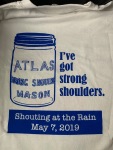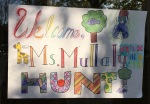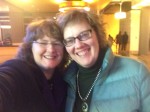The Major Role of Minor Characters
~~~~~~~~~~
If used well, minor characters aren’t minor at all.
We know that minor characters should never be “cardboard.” That every character needs  to be fully fleshed out. For example, avoiding stereotypes is good. Not every football player struggles in school. Not every cheerleader is blond and mean. Generally, good characters (like real people) are a myriad of different elements.
to be fully fleshed out. For example, avoiding stereotypes is good. Not every football player struggles in school. Not every cheerleader is blond and mean. Generally, good characters (like real people) are a myriad of different elements.
Yes, minor characters need to stand on their own—be interesting, compelling. But why include them in the ways that we do? Because they can be an excellent tool in teaching the reader something about our main character. And that is the ultimate objective, isn’t it?
 One of my minor characters in ONE FOR THE MURPHYS would have some choice words for me at labeling her “minor.” She’d put me in my place, frighten me, and then make me laugh with her choice of words, lobbing some comment about how I’m drowning in my own gene pool.
One of my minor characters in ONE FOR THE MURPHYS would have some choice words for me at labeling her “minor.” She’d put me in my place, frighten me, and then make me laugh with her choice of words, lobbing some comment about how I’m drowning in my own gene pool.
Her name is Toni. She’s gruff. She says what’s on her mind even when it will offend people. In fact, if it will offend, all the better. Yes, her self-protection strategies are extreme and they’ve kept her alone. Her walls are high and formidable.
These are some of the things that can happen within a person when they feel like no one loves them for who they really are. Some pretend, trying to be someone they’re not to fit in. Not Toni. And she apologizes for nothing. To a casual observer, she is not vulnerable. Ever. And at the beginning of the book, she considers this to be her greatest strength. A badge of honor.
Toni had found a kindred spirit, though. A fictional girl who had been literally shunned since the d ay she was born. She is bright and strong and determined. She speaks up for what is right and in the name of those not able to protect themselves—regardless of the consequences. Although gruff (and green) on the outside, she is filled with compassion and love. She is the Wicked Witch of the West named Elphaba from the Broadway musical (and the book by Gregory McGuire), WICKED.
ay she was born. She is bright and strong and determined. She speaks up for what is right and in the name of those not able to protect themselves—regardless of the consequences. Although gruff (and green) on the outside, she is filled with compassion and love. She is the Wicked Witch of the West named Elphaba from the Broadway musical (and the book by Gregory McGuire), WICKED.
The day Carley meets her, Toni is wearing a WICKED t-shirt, which Carley assumes merely label’s Toni’s personality. When asked to do a social studies project on a person that has changed the world for good, she insists on doing Stephen Schwartz, the man who wrote the lyrics to Wicked’s genius musical score. She dreams of starring on Broadway like Idina Menzel. But at this point, Carley still didn’t understand. All the layers of Toni. But, as Carley changes her perspective—develops an understanding of Toni—a light shines back on Carley, teaching the reader more about her.
As these two girls, who start out as bitter enemies, get to know each other’s hearts and stories they learn how much they have in common where it counts. They develop a shared love for Elphaba’s signature song, Defying Gravity, and its messages within for two girls who are wounded in different ways but both wounded just the same. Who both ache with a void in their guts but how those feelings manifest themselves very differently—yet the same— in each one of them.
Using minor characters in this way is a prime example of writing that “shows rather than tells.” They are there to heighten tension. Move the action. Push our protagonists where they don’t want to go. Sometimes an unexpected reaction from a minor character teaches us something as well. For example, consider the kid always in trouble with a teacher who tries to defend him. Can we possibly draw a conclusion about the child by the teacher’s protectiveness? So, minor characters need to be fully formed, free-standing people. But, in the end, their main purpose is to shine a spot light on our main character.
 Consider The Breakfast Club, one of my favorite 80’s movies. Completely dependent on character—a human pinball machine of vulnerability and emotion. Think of how much we learn about each one of those six students because each of them is pushed by another into revealing something they normally wouldn’t. And how much we learn about them by their individual reactions to the principal. If you’d like a reminder of how characters shine lights upon each other, think about pulling this movie out.
Consider The Breakfast Club, one of my favorite 80’s movies. Completely dependent on character—a human pinball machine of vulnerability and emotion. Think of how much we learn about each one of those six students because each of them is pushed by another into revealing something they normally wouldn’t. And how much we learn about them by their individual reactions to the principal. If you’d like a reminder of how characters shine lights upon each other, think about pulling this movie out.
If you have not seen Broadway’s Wicked, I suggest that you do. For all kinds of reasons I could do an entire post on. But in relation to this post—the writing in Wicked is masterful. Characters are constantly shining spotlights on each other in the ways that I’ve described. And it is all so organic.
I was so moved by Wicked. I think it drove the writing of the Murphys. I often write with music but never with lyrics. Except in the case of Murphys and Wicked. I never made a decision to choose this music; it chose me. And out of it, Toni was born.
I do love Carley Connors, but I must confess that my favorite character may be Toni. I can see writing a novel some day with her as the protag. And I will then have to create minor characters that shine lights upon her.
~~~~~~~~~~~~~~
Here is a video of WICKED’S Idina Menzel singing Defying Gravity:











































Chef Spirodactus from ‘The Art of Fielding’ (Chad Harbach) is a very strong minor character.
LikeLike
Thanks, Andy! I’ll look that one up!
Thanks for stopping by! 😉
LikeLike
Wicked is my favorite play (and book) for all the reasons you mentioned. I am looking forward to seeing how you used it in One for the Murphys.
You make very good points about the role of minor characters. I think they are also there to broaden the reader’s view of the world you’ve created by adding other perspectives and experiences outside the pov of your main character.
LikeLike
Hey, Stacy! YES! You are correct about broadening the readers view–very true. Certainly, multiple perspectives make things more interesting.
Thanks for stopping by and weighing in! 😉
LikeLike
I seriously want this ARC and I need to inbox you about the whole Wicked Elphaba thing!!!! You’re not going to believe this!!!!!
LikeLike
HA!! REALLY, KIm?! Have we stumbled upon *another* coincidence?! 😉 Looking forward to hearing the latest.
Thanks–as always–for your enthusiasm. You’re awesome!
LikeLike
I didn’t know about the role ‘Wicked” plays in your novel. I guess I better read it before “One for the Murphy’s” comes out! (Because you know I’ll be reading it ASAP).
LikeLike
Thanks so much, Michelle! The books pertains to the show more thant he book, actually. The book is wonderful, too, but it is darker than the play–not really MG material. 😉
Looking forward to seeing you soon!
Lynda
LikeLike
Can’t wait for this book (and to learn more about your wonderful characters).
LikeLike
Thanks so much, Caroline!
I read MAY B and loved it–I’m so glad that it is doing so well! Well deserved! 😉
LikeLike
I really think minor characters bring the story together. Without them, I never really feel like I’m living the story. The world building gets fleshed out more when the minor characters have a purpose, IMO. Great post!
tweeted:
https://twitter.com/#!/deadtossedwaves/status/174194133798367232
Vivien
deadtossedwaves at gmail dot com
LikeLike
Thanks so much, Vivien! And thanks for the Tweet, too! 😉
LikeLike
However I hate it when I like the minor characters more than the major ones. I can’t wait to see Wicked again, and will look at it differently after reading your post and hopefully the book.
LikeLike
Hey, Marge! Yes, I was thinking last night that I’d like to see Wicked. Again! 😉
LikeLike
This is a great post. Thank you.
LikeLike
Thank you, Mona!
LikeLike
would love an arc!
following GFC FB TWITTER
childrensbook13 at aol dot com
LikeLike
awesome giveaway!
would love an arc 🙂
LikeLike
Thank you!
LikeLike
This sounds like a wonderful book! Thanks for the review of the roles of characters too!
LikeLike
Oooh, I’d love an ARC, Lynda! I’m looking forward to reading about all of your characters, minor, main, and everyone in between. 🙂
LikeLike
Just as *I* am looking forward to YOUR book, FLYING THE DRAGON!! 😉
LikeLike
Great thoughts — I have a minor character who betas love more than the MC, which makes me wonder….but without that character, MC won’t move along the path she does. Thanks for highlighting the necessity of those “minor” players!
LikeLike
Thanks for your thoughts, Jennifer. I agree–the MC sometimes needs that minor charater to push them to who they are meant to be–facilitates the emotional arc.
LikeLike
I was in a play once and I heard someone say ‘There are no small parts, only small actors.’ I think this applies to our characters, too. One of the things I love about Harry Potter is the minor characters, which must number in the hundreds, and who each have their own uniqueness.
Good post.
LikeLike
Yes! Harry Potter is an excellent example of this! I almost cited some of the characters in this post…Then, I didn’t. 🙂
LikeLike
great post! made me see things in a deeper light. i’d love to win the ARC.
lou
LikeLike
great post! thanks
LikeLike
Thanks, Lou!
LikeLike
Hmmm. You have me thinking about the minor characters in my next book and what they can teach the reader about the main character. Very intriguing.
I was going to buy your book anyway — and I already knew my teen will love it. But tying in Wicked? She’ll be ecstatic. Can’t wait to read it!
LikeLike
Thanks SO much, Ruth. I’d love it if your daughter loves Murphys–just as my niece loves Ellie!! 😉
LikeLike
Great post, Lynda! I can’t wait to read your book–congratulations again!
LikeLike
Thanks so much, Kristine!
LikeLike
I loved this post. Can’t wait to read the book! Minor characters, for me, are really never minor, for without them, our novels would have huge holes. Congratulations!!!!
LikeLike
Very true, Betsy. Thanks!
LikeLike
This is a terrific post. I can’t wait to read your book. I put a shout-out for this post on Facebook.
LikeLike
Hey, Rosi! Thank you SO much for your support!
LikeLike
Thanks for such an enlightening post. I’ve always felt that minor characters mattered (as a reader), and in some of my favorite books the minor characters are as interesting to me as the major ones. But I’ve never analyzed why. I love the idea that they are all part of an organic whole, shining lights on each other.
LikeLike
Thanks so much for you comment, Elizabeth!
LikeLike
Well said!
I’ve never seen Wicked. Now I’ve got to!
LikeLike
Thanks, Linda! Yes, I do think you would love the show! We should have a writers’ night to the theater. I could be persuaded to go again…I guess… 😉
LikeLike
Pingback: Linda Crotta Brennan: Thanks to you and to Secondary Characters « NESCBWI Kidlit Reblogger
Great post. I loved Wicked! And I just put in a reference to Elphaba in my own book. Congrats on the book, It sounds really interesting!
LikeLike
Oh, Carmela! So, you are a fellow fan. I do think the message of rising above circumstances that try to pull you down is a good one–particularly for kids.
Good luck to you on your book!
LikeLike
I loved Wicked and The Breakfast club, but until now, I’ve never made any connections between the two. Thanks for your insight on minor characters, who of course are minor in name and word count only.
LikeLike
Minor in name and word count only–I like it!! Thank you! 😉
LikeLike
Wow! A great post, Lynda! Very insightful and thought provoking. I love Wicked, too! Thanks for sharing the video. Very cool!
LikeLike
Hey, Laurie! Thanks for stopping by!
LikeLike
I loved your character Toni, too. Awesome post Lynda.
LikeLike
Thanks, Sarah! I’m honored to have you as a first reader! 😉
LikeLike
AND THE WINNER IS…
aneducationinbooks!
Please contact me and I will get your signed ARC in the mail! 😉
Thanks to all who entered!!!
LikeLike
You’ve sold me on Wicked! I am ITCHING to read One for the Murphys – can’t wait!
LikeLike
Thanks this blog really helped my project i’m doing.Looking forward to reading all the cool books.
LikeLike